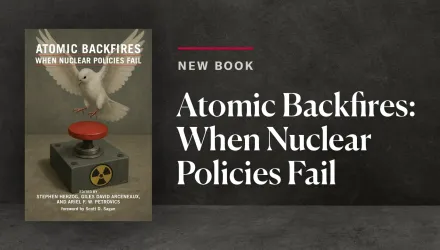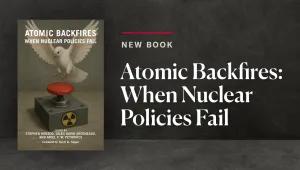Instead of rushing to war, US should continue on its path of strategic patience
What to do about an increasingly truculent and threatening Iran is now the most important foreign policy challenge of 2012. Republican presidential candidates are all over the strategic map. Rick Santorum wants the United States and Israel to bomb. Mitt Romney and Newt Gingrich accuse President Obama of weakness, but it isn’t clear that they would act much differently. Ron Paul opposes force against Iran because “they don’t threaten our national security.’’
A more sophisticated plan would be to stick with the strategy that two unlikely partners - Presidents Barack Obama and George W. Bush - have tried since 2005: punish and isolate Iran with ever tougher sanctions while leaving the door open to negotiations and an eventual diplomatic solution. As an Iranian nuclear weapon is rightly unacceptable to the United States, both presidents left the threat of force on the table to concentrate the attention of mullahs in Tehran. This strategy is not by any means guaranteed to succeed. But it is beginning to gather greater support in key capitals and has quiet bipartisan support among many congressional leaders, keeping us, so far, out of another Mideast war.
Iran is the leading state sponsor of terrorism in the Middle East and a pernicious troublemaker in Iraq and Afghanistan. That it wants to go nuclear is not contested seriously in any major world capital. As the Bush administration’s undersecretary of state working to stop Iran’s nuclear program, I didn’t encounter a single international official, including from China and Russia, who disagreed that Iran’s enrichment efforts and missile tests are designed for just one purpose - to achieve a nuclear weapons capacity. To complicate matters, Iran has recently threatened to shut down the strategic Strait of Hormuz to international shipping, raising the stakes in an already tense standoff between US and Iranian navies in the Persian Gulf.
Proponents of a US or Israeli military strike have not made a credible case that it would resolve the problem. Military strikes cannot destroy every Iranian lab and kill every scientist involved with the program. At best, a major assault would delay Iran’s program but not end the threat. It could also lead to a wider war. Obama would have to weigh the benefit of an attack against the probability that Iran, a foe much stronger than Saddam Hussein’s Iraq ever was, would hit back.
The more deliberate strategy pursued by Obama and Bush to convince Tehran to step away from the nuclear precipice is backed by our European allies, Russia, and China. These countries have made repeated offers to Iran to negotiate. Iran has refused to deal, believing, no doubt, that the US-led international coalition is weak and divided. That, in turn, has emboldened critics to charge sanctions can’t work and that force is the only way to resolve the issue.
But newly approved bipartisan sanctions may change that calculation. At the insistence of congressional leaders, Obama will now have the authority to target Iran’s Central Bank and foreign firms that do business with it. Meanwhile, the European Union is on the verge of approving an equally powerful oil embargo. These will be, by far, the most lethal sanctions ever imposed on Iran. And just last week, the Obama team launched a major push to convince the three key Asian importers of Iranian energy - China, South Korea, and Japan - to join the sanctions effort. The president has also quietly continued Bush’s program to accelerate US military support for Saudi Arabia, the United Arab Emirates, and other Arab countries to contain Iran’s growing military power. This promises to make Iran an international pariah and is the most serious US counterstrike in our long-running chess match against Iran’s myopic supreme leader, Ali Khamenei.
What does this mean for our national debate on Iran and the 2012 election? First, it would be a serious strategic mistake to strike Iran now and give up on the most promising sanctions campaign in years. That is why restraining Israel from attacking Iran on its own is so important this year. Second, we should not discount the possibility that diplomacy might be the ultimate answer to the Iran threat. We have not had a serious and sustained negotiation with the Iranian government in more than 30 years. To choose war when we have not yet given diplomacy a serious try would be foolhardy and unconscionable. Third, we are a lot stronger than Iran will ever be and can outlast them in a match of strength and will. Time and geopolitics lean heavily on our side in this long-term test - a 21st century version of President Kennedy’s “long twilight struggle.’’
Of course, Obama’s rational and carefully nuanced approach to Iran may not quiet impatient critics in our overheated political arena who will castigate him for being soft and insufficiently martial. But for now, Obama has skillfully kept open the possibility of negotiations while leaving force as a last resort and at a time of our choosing, not Iran’s. John Quincy Adams famously warned Americans “not to go abroad in search of monsters to destroy.’’ We may yet have to consider force against a dangerous Iran but, for now, Obama and Bush’s careful strategic patience is a far smarter path for our country.
Burns, Nicholas. “What to do about Iran.” The Boston Globe, January 20, 2012





